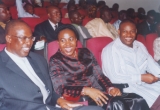Niger Delta
‘Traditional Rulers, Stakeholders In Dev’

Rivers State Deputy Governor, Engr. Tele Ikuru (right) with the Bayelsa State Governor, Chief Timipre Sylva (left) and his wife Alanyingi at a function in Yenagoa, Bayelsa State, recently.
Traditional Rulers and institutions in the South South region have been described as integral stakeholders in the quest by the federal and state governments to implement sustainable development programmes for the peoples of the Niger Delta. This call was contained in a statement issued by the Ashcraft Centre for Democracy and Legislative Development, a civil society Non Governmental Organisation, to announce a planned retreat for traditional leaders of the South South scheduled to hold in Port Harcourt, Rivers State from 24th to 27th August, 2009. According to the statement, signed by the Secretary, Planning Committee, Dr Chiakor, Alfred Orkuma, the retreat is a signature event planned with the view to building the capacities of traditional royalties to enable them respond to operating challenges in a democratic dispensation especially in the areas of advocacy, mobilization, community development, conflict mediation and resolution. Dr. Chiakor said that, “The imperative of the retreat is predicated on the premise that as Nigeria seeks to build and strengthen its democracy, there is the compelling urgency to recognize the contributions and centrality of traditional institutions in the configuration of its democratic equation”. Speaking further the Ashcraft Scribe stated that, “The government, both at the Federal, state and local levels are conscious of the necessity of mainstreaming traditional institutions in its evolving democracy and at the same time consolidating mechanisms for grassroots development, advocacy and conflict mediation and resolution and has taken major steps in involving traditional institutions in the democratic governance project” adding that “This is manifested in the empowerment initiatives for the traditional institutions like procurement of automobiles and other welfare packages. It is therefore not enough that these welfarist initiatives are provided without definitive roles designed for the institutions. This informs the thrust of this retreat,” the statement said. Highlighting the importance of traditional rulers in nation building, the statement opined that, “traditional institutions can valuably orientate their different communities towards their respective values, cultures and histories, as basis on which politics can be construed.” Explaining the motivation for the retreat, the statement reported that the event will help to align and harmonize traditional governance institutions with the mechanisms of the modern state amongst other imperatives. “This retreat is imperative because it has a direct practical relevance in seeking to help shape the future of our collective identity, strengthen the ideals of our traditional institutions to our collective psyche and as well invest in it as a strategy for positive confidence building without forgetting our collective history and heritage” The idea behind all this, the statement continued, “is to keep the flame of our rich cultural heritage alive without losing the authority to interprete the meaning of concepts that are essential constituents of our unique traditions”. Speaking further, Dr. Chiakor also noted that, “This is principally borne out by a growing recognition that capable democratic states must be grounded on indigenous social values and contexts, while adapting to changing realities” According to him, the retreat also hopes to seize the opportunity to confront head on two grave problems: the considerable loss of confidence among citizens in the effectiveness and providence of our traditional institutions, and the profound insecurity of our people in a world that is changing more swiftly and fundamentally than ever before. The retreat, which is scheduled to take place at the Atlantic Hall, Hotel Presidential, Port Harcourt Metropolis from the 24th to 27th August, 2009, is being put together by the Ashcraft Centre for Democracy and Legislative Development, a non- partisan, non profit making CSO which operates a neutral forum for open discussion and informed dialogue and whose core objective is to build capacities for good governance, human resources engineering and policy stimulation.
Niger Delta
Bayelsa Recommits To Building World-Class Med Varsity …As VC Marks Anniversary

Niger Delta
Okpebholo Constitutes Committee On MOWAA … Names Oshiomhole Chairman

Niger Delta
CSOs Demand Probe Of Ex-Governor In C’River


